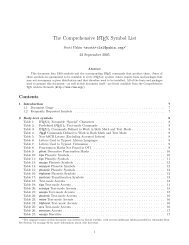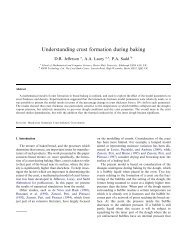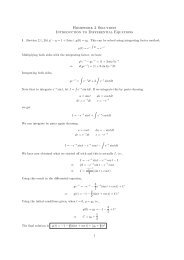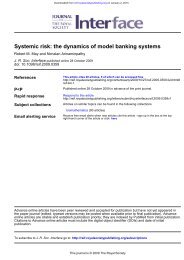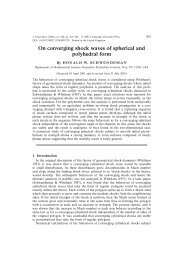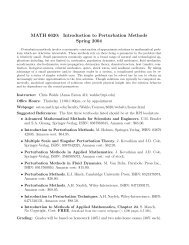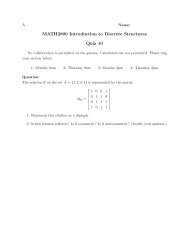- Page 1:
ILOG CPLEX C++ API 9.0 Reference Ma
- Page 4 and 5:
T ABLE OF C ONTENTS IloCplex::Branc
- Page 6 and 7:
About This Manual This reference ma
- Page 8 and 9:
Concepts Branch & Cut IloCplex, lik
- Page 10 and 11:
It is possible to tell IloCplex to
- Page 12 and 13:
Group optim.cplex.cpp The API of IL
- Page 14 and 15:
IloCplex::Algorithm IloCplex::Basis
- Page 16 and 17:
ILOFLOAT, for continuous, ILOINT, f
- Page 18 and 19:
ILOBARRIERCALLBACK0 ILOBARRIERCALLB
- Page 20 and 21:
ILOCONTINUOUSCALLBACK0 ILOCONTINUOU
- Page 22 and 23:
ILOCPLEXGOAL0 } return 0; This macr
- Page 24 and 25:
ILOCUTCALLBACK0 ILOCUTCALLBACK0 Cat
- Page 26 and 27:
ILOFRACTIONALCUTCALLBACK0 ILOFRACTI
- Page 28 and 29:
ILOINCUMBENTCALLBACK0 ILOINCUMBENTC
- Page 30 and 31:
ILOMIPCALLBACK0 ILOMIPCALLBACK0 Cat
- Page 32 and 33:
ILONODECALLBACK0 ILONODECALLBACK0 C
- Page 34 and 35:
ILOPROBINGCALLBACK0 ILOPROBINGCALLB
- Page 36 and 37:
ILOSOLVECALLBACK0 ILOSOLVECALLBACK0
- Page 38 and 39:
IloCplex IloCplex Category Class In
- Page 40 and 41:
IloCplex public IloCplex::CplexStat
- Page 42 and 43:
IloCplex public void public void pu
- Page 44 and 45:
IloCplex IloCplex::NodeSelect IloCp
- Page 46 and 47:
IloCplex Mathematical Programming m
- Page 48 and 49:
IloCplex IloCplex effectively treat
- Page 50 and 51:
IloCplex classes that allow the use
- Page 52 and 53:
IloCplex When IloCplex is not divin
- Page 54 and 55:
IloCplex public const IloConstraint
- Page 56 and 57:
IloCplex This method deletes all la
- Page 58 and 59:
IloCplex to use for the constraint
- Page 60 and 61:
IloCplex public IloCplex::CplexStat
- Page 62 and 63:
IloCplex Note:CPLEX resizes these a
- Page 64 and 65:
IloCplex This method returns the nu
- Page 66 and 67:
IloCplex public IloCplex::PWLFormul
- Page 68 and 69:
IloCplex public void getValues(cons
- Page 70 and 71:
IloCplex This method creates and re
- Page 72 and 73:
IloCplex This method sets the prefe
- Page 74 and 75:
IloCplex its subgoals. See the conc
- Page 76 and 77:
IloCplex::Algorithm IloCplex::Algor
- Page 78 and 79:
IloCplex::BarrierCallbackI IloCplex
- Page 80 and 81:
IloCplex::BasisStatus IloCplex::Bas
- Page 82 and 83:
IloCplex::BoolParam IloCplex::BoolP
- Page 84 and 85:
IloCplex::BranchCallbackI IloCplex:
- Page 86 and 87:
IloCplex::BranchCallbackI ControlCa
- Page 88 and 89:
IloCplex::BranchCallbackI IloCplex:
- Page 90 and 91:
IloCplex::BranchCallbackI NodeData
- Page 92 and 93:
IloCplex::BranchCallbackI no branch
- Page 94 and 95:
IloCplex::BranchDirection IloCplex:
- Page 96 and 97:
IloCplex::Callback IloCplex::Callba
- Page 98 and 99:
IloCplex::CallbackI IloCplex::Callb
- Page 100 and 101:
IloCplex::CallbackI callbacks can a
- Page 102 and 103:
Callback::Type Callback::Type Categ
- Page 104 and 105:
IloCplex::ContinuousCallbackI Descr
- Page 106 and 107:
IloCplex::ControlCallbackI IloCplex
- Page 108 and 109:
IloCplex::ControlCallbackI MIPCallb
- Page 110 and 111:
IloCplex::ControlCallbackI This met
- Page 112 and 113:
IloCplex::ControlCallbackI For each
- Page 114 and 115:
ControlCallbackI::IntegerFeasibilit
- Page 116 and 117:
IloCplex::CplexStatus See also the
- Page 118 and 119:
IloCplex::CrossoverCallbackI IloCpl
- Page 120 and 121:
IloCplex::CutCallbackI IloCplex::Cu
- Page 122 and 123:
IloCplex::CutCallbackI from a user-
- Page 124 and 125:
IloCplex::DisjunctiveCutCallbackI I
- Page 126 and 127:
IloCplex::DualPricing IloCplex::Dua
- Page 128 and 129:
IloCplex::FlowMIRCutCallbackI IloCp
- Page 130 and 131:
IloCplex::FractionalCutCallbackI Il
- Page 132 and 133:
IloCplex::Goal IloCplex::Goal Categ
- Page 134 and 135:
IloCplex::GoalI IloCplex::GoalI Cat
- Page 136 and 137:
IloCplex::GoalI public IloInt publi
- Page 138 and 139:
IloCplex::GoalI Methods public void
- Page 140 and 141:
IloCplex::GoalI Returns the solutio
- Page 142 and 143: IloCplex::GoalI const IloNumVarArra
- Page 144 and 145: IloCplex::GoalI Returns the branch
- Page 146 and 147: IloCplex::GoalI public IloBool isIn
- Page 148 and 149: GoalI::BranchType GoalI::BranchType
- Page 150 and 151: GoalI::IntegerFeasibilityArray Goal
- Page 152 and 153: IloCplex::HeuristicCallbackI protec
- Page 154 and 155: IloCplex::HeuristicCallbackI protec
- Page 156 and 157: IloCplex::HeuristicCallbackI The pa
- Page 158 and 159: IloCplex::IISStatusArray IloCplex::
- Page 160 and 161: IloCplex::IncumbentCallbackI MIPCal
- Page 162 and 163: IloCplex::IntParam IloCplex::IntPar
- Page 164 and 165: IloCplex::IntParam See the referenc
- Page 166 and 167: IloCplex::IntParam = CPX_PARAM_COLR
- Page 168 and 169: IloCplex::IntParam = CPX_PARAM_FRAC
- Page 170 and 171: IloCplex::InvalidCutException IloCp
- Page 172 and 173: IloCplex::LazyConstraintCallbackI M
- Page 174 and 175: IloCplex::MIPCallbackI protected Il
- Page 176 and 177: IloCplex::MIPCallbackI IloCplex::No
- Page 178 and 179: IloCplex::MIPCallbackI Returns the
- Page 180 and 181: MIPCallbackI::NodeData MIPCallbackI
- Page 182 and 183: IloCplex::MIPEmphasisType = CPX_MIP
- Page 184 and 185: IloCplex::MultipleObjException IloC
- Page 186 and 187: IloCplex::NetworkCallbackI The meth
- Page 188 and 189: IloCplex::NodeCallbackI protected v
- Page 190 and 191: IloCplex::NodeCallbackI protected I
- Page 194 and 195: IloCplex::NodeEvaluatorI IloCplex::
- Page 196 and 197: IloCplex::NodeEvaluatorI branch, 0
- Page 198 and 199: IloCplex::NodeSelect IloCplex::Node
- Page 200 and 201: IloCplex::NumParam = CPX_PARAM_EPOP
- Page 202 and 203: IloCplex::PWLFormulation IloCplex::
- Page 204 and 205: IloCplex::PresolveCallbackI model,
- Page 206 and 207: IloCplex::ProbingCallbackI IloCplex
- Page 208 and 209: IloCplex::ProbingCallbackI This met
- Page 210 and 211: IloCplex::Quality Primalobj, Primal
- Page 212 and 213: IloCplex::Quality = CPX_SUM_X SumSc
- Page 214 and 215: IloCplex::SearchLimit The default c
- Page 216 and 217: IloCplex::SearchLimitI creates a go
- Page 218 and 219: IloCplex::SimplexCallbackI ILOG CPL
- Page 220 and 221: IloCplex::SolveCallbackI Inherited
- Page 222 and 223: IloCplex::SolveCallbackI const IloN
- Page 224 and 225: IloCplex::UnknownExtractableExcepti
- Page 226 and 227: IloCplex::UserCutCallbackI MIPCallb
- Page 228 and 229: IloCplex::VariableSelect Group opti
- Page 230 and 231: IloCplex::PWLFormulation IloCplex::
- Page 232 and 233: IloCplex::PWLFormulation Descriptio
- Page 234 and 235: IloCplex::LazyConstraintCallbackI I
- Page 236 and 237: IloCplex::UserCutCallbackI Inherite
- Page 238: I NDEX ILOFRACTIONALCUTCALLBACK0 26



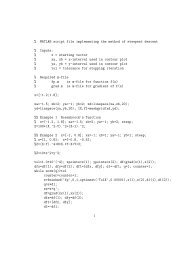

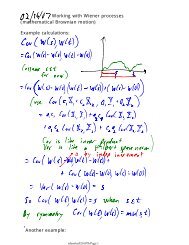

![MATH 1500 Sample Questions Exam 2 1. [3.7] A 10-ft plank is ...](https://img.yumpu.com/43861920/1/190x245/math-1500-sample-questions-exam-2-1-37-a-10-ft-plank-is-.jpg?quality=85)

